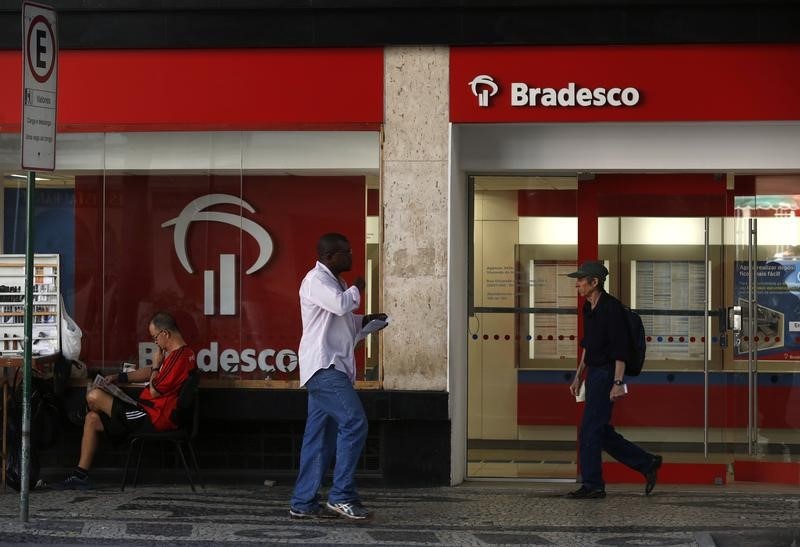By Guillermo Parra-Bernal and Aluísio Alves
SAO PAULO (Reuters) - HSBC Holdings Plc (L:HSBA) agreed to sell its Brazilian unit to Banco Bradesco SA (SA:BBDC4) for $5.2 billion (3.3 billion pounds), retreating from the second-largest emerging market economy after years of disappointing performance.
Europe's No. 1 bank said in a statement on Monday that the accord with Bradesco includes the disposal of the HSBC Bank Brasil SA Banco Múltiplo and the HSBC Serviços e Participações Ltda units. The sale, which still requires regulatory approval and was sealed on July 31, could be completed by June next year.
The purchase price, which could undergo adjustments to reflect the net asset value of both businesses and is equivalent to 1.8 times book value, was way above what analysts expected. Reuters reported on July 20 that Bradesco had entered exclusive talks with HSBC after offering to pay about 12 billion reais, or 1.2 times book value, for HSBC Brasil.
Other sources had told Reuters in June that fellow suitor Itaú Unibanco Holding SA (SA:ITUB4) had placed a bid below book value for HSBC's Brazilian business. Bradesco, Brazil's second-largest private-sector bank, is currently trading at about 1.5 times book value.
The acquisition will allow Osasco, Brazil-based Bradesco to close the asset gap with larger rivals Itaú and state-controlled banks Banco do Brasil SA (SA:BBAS3) and Caixa Econômica Federal. HSBC Brasil's focus on high-income customers fits well into Bradesco's plan to ramp up sales of specialised financial services for the wealthy and larger corporations.
"The acquisition will create scale gains and the optimal use of business platforms, leading to bigger nationwide coverage ... and reinforcing the bank's presence in the high-end income segment," Bradesco said in a securities filing.
STRATEGY MISSTEPS
HSBC, which arrived in Brazil late in the 1990s, never gained enough size to pose a real threat to Itaú, Bradesco or Banco do Brasil, the nation's top lender by assets. HSBC Brasil has 854 branches, 21,000 employees and assets of about 170 billion reais, representing about 2.3 percent of Brazil's banking system assets.
Strategy missteps coupled with rising competition turned the unit into a problem for HSBC Chief Executive Officer Stuart Gulliver, who in June laid out plans to slash nearly one in five jobs worldwide and fix operations which, like in Brazil, were grappling with operational underperformance, high compliance costs and fierce competition.
Slow asset growth prevented HSBC Brasil from gaining scale to win market share, and return on equity was a negative 4.2 percent last year. ROE, as the gauge is known, reached about 16 percent four years ago.
The disposal of the Brazilian business will help HSBC reduce risk-weighted assets by about $37 billion. Gulliver set a target of $290 billion in planned asset reductions to take advantage of potential growth opportunities elsewhere.
"I am pleased to be able to announce today a transaction which achieves both a solid financial outcome and swift delivery
of one of our stated actions," Gulliver said in the HSBC statement.

HSBC was advised on the deal by Goldman Sachs Group Inc (NYSE:GS). Bradesco was advised on the transaction by its own investment banking unit Bradesco BBI, JPMorgan Chase & Co (NYSE:JPM) and NM Rothschild & Sons Ltd.